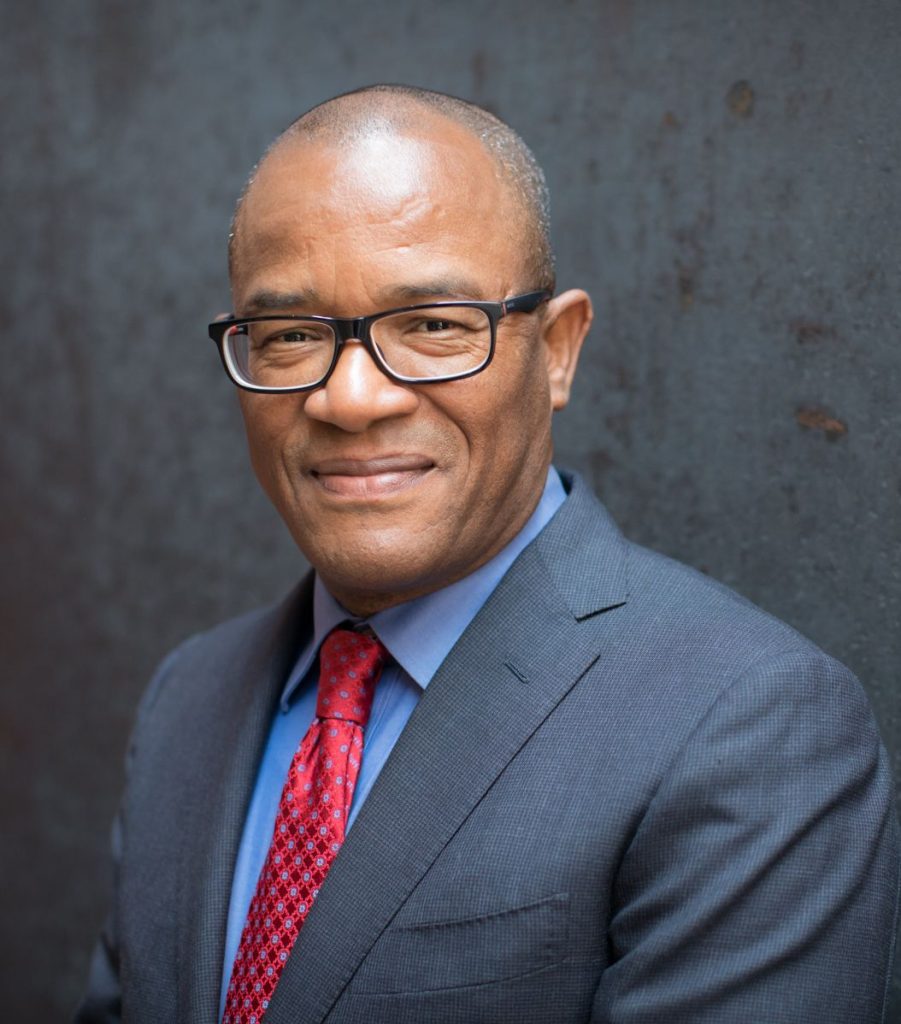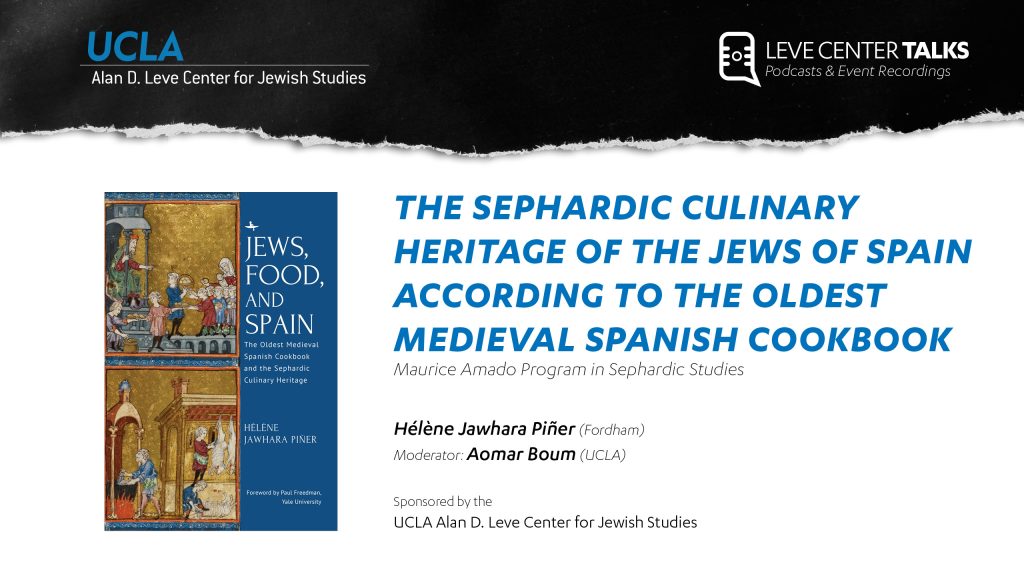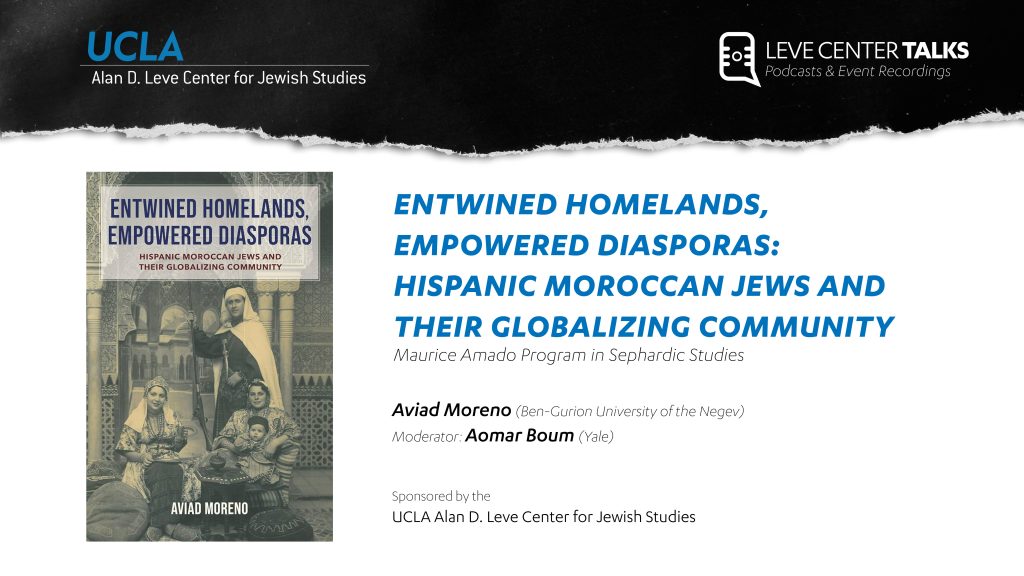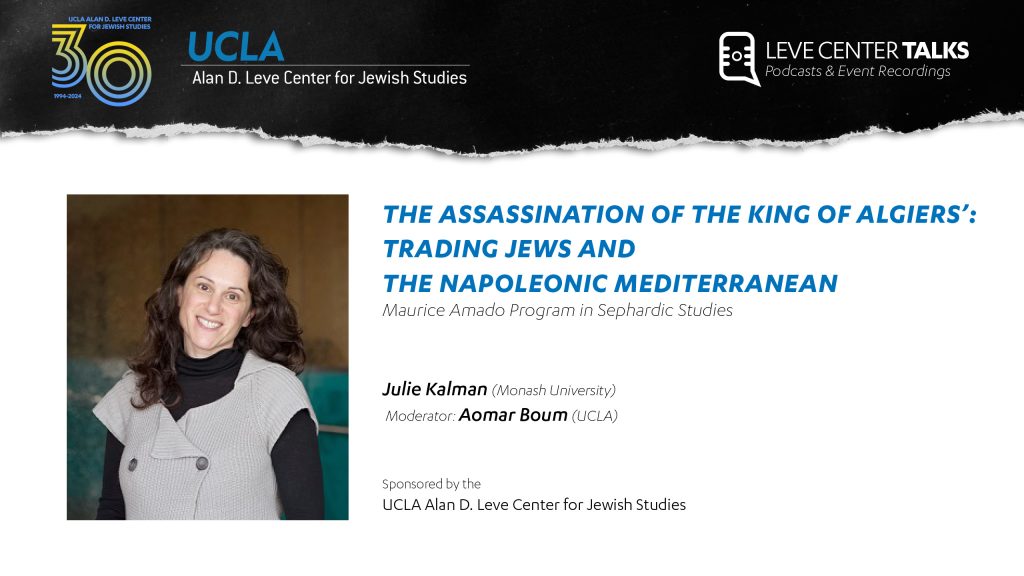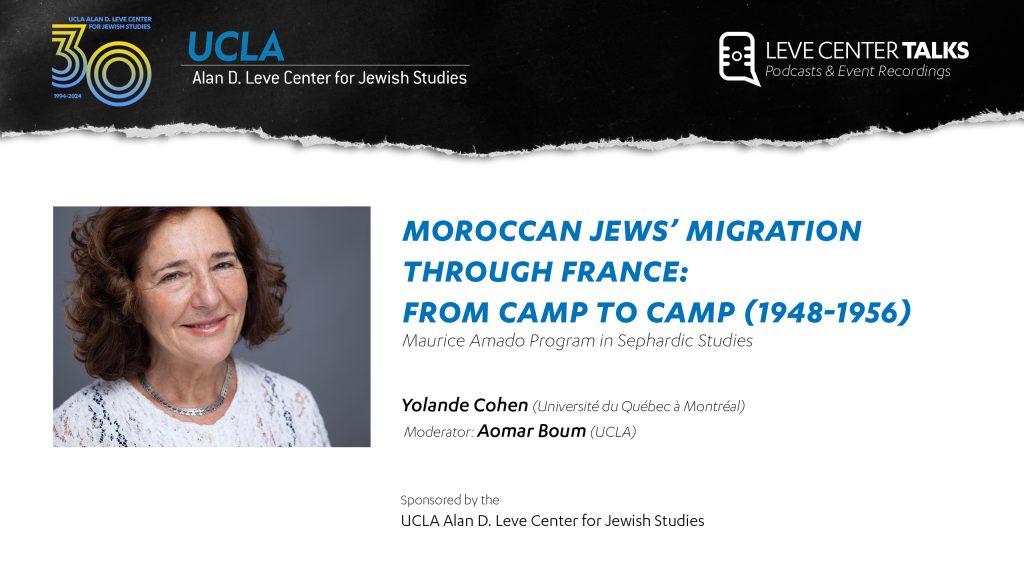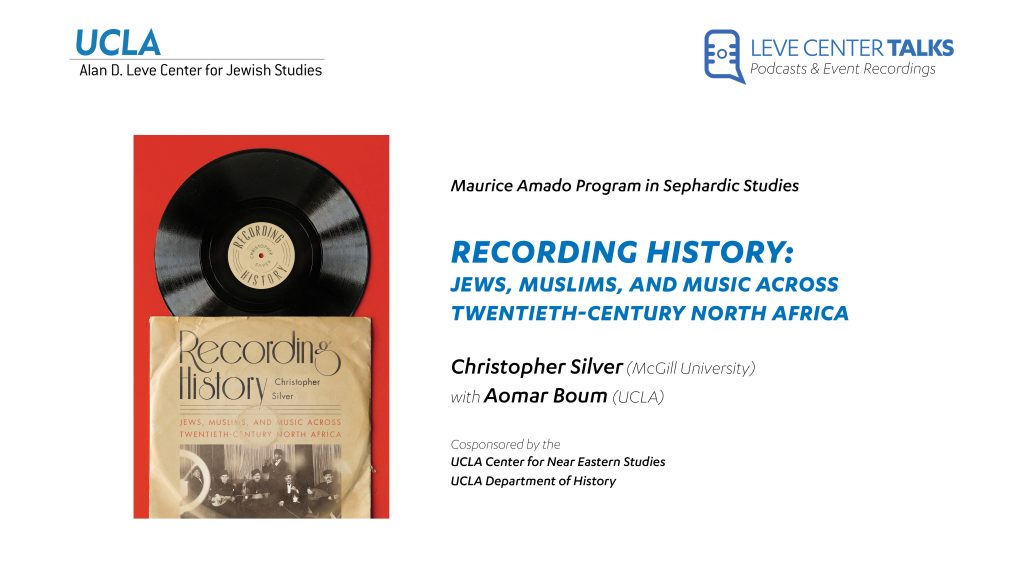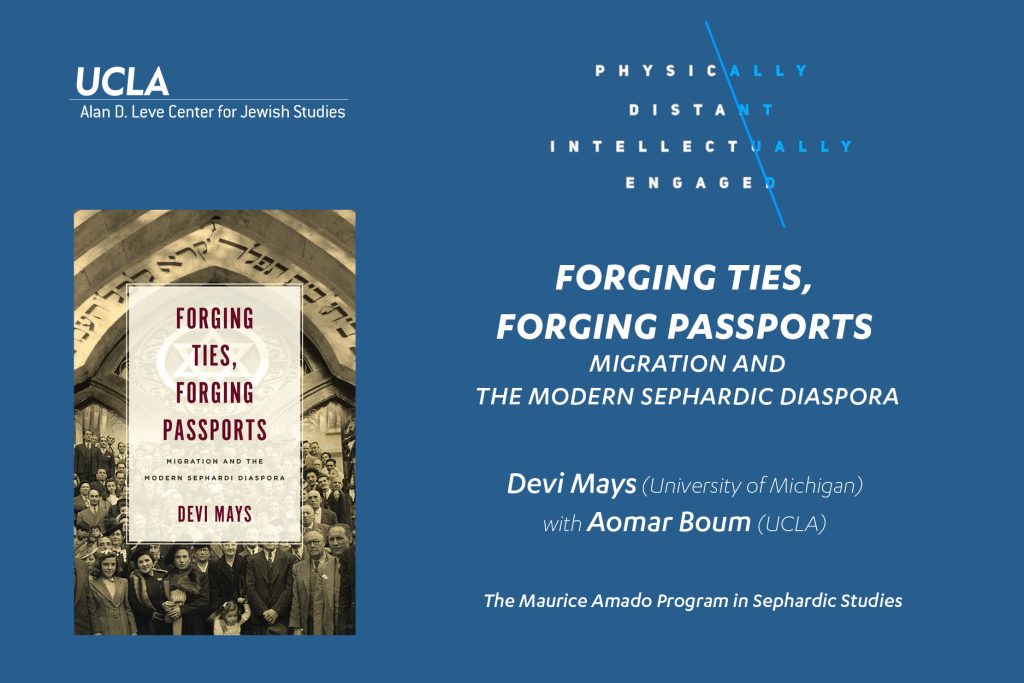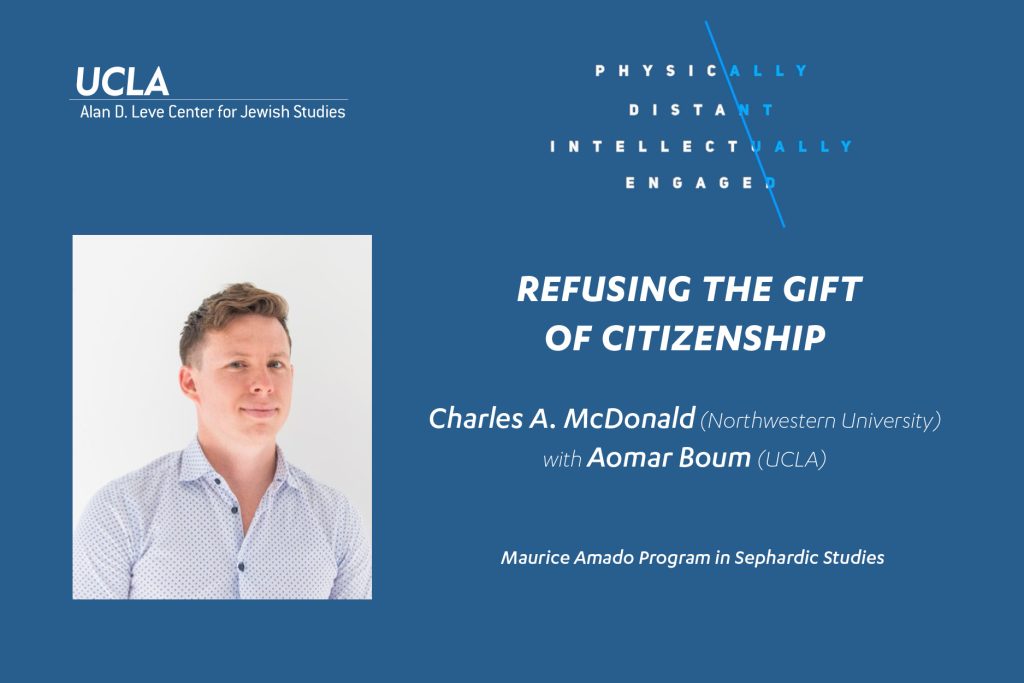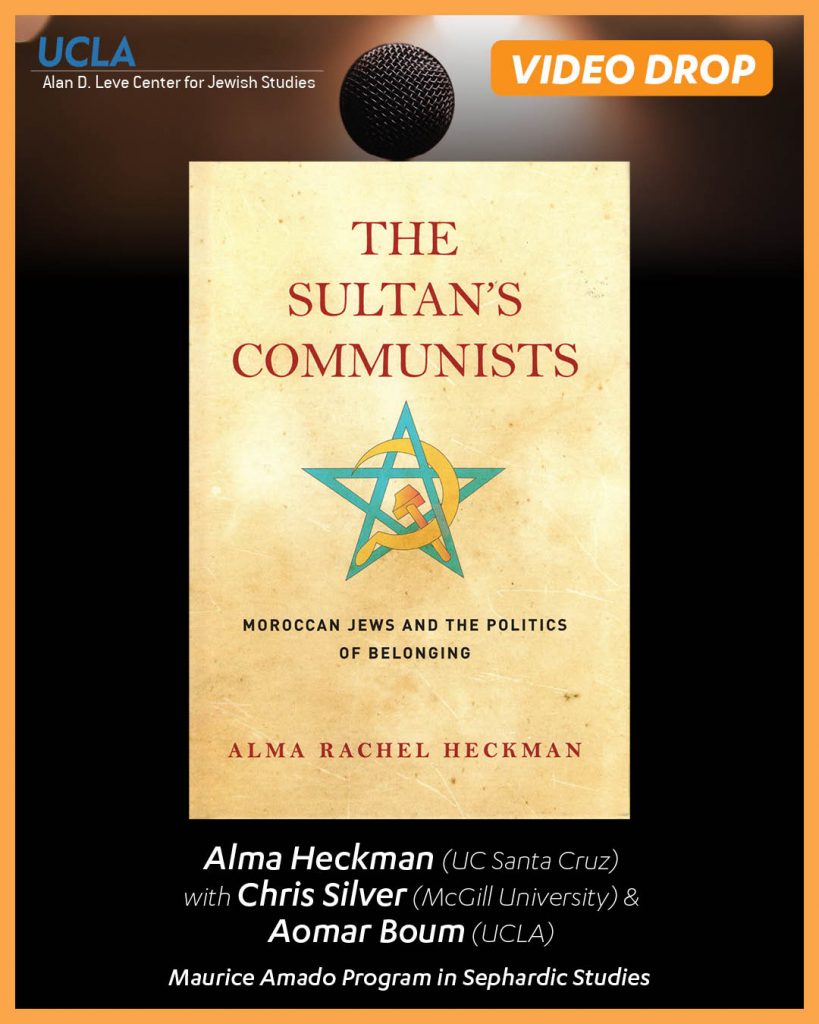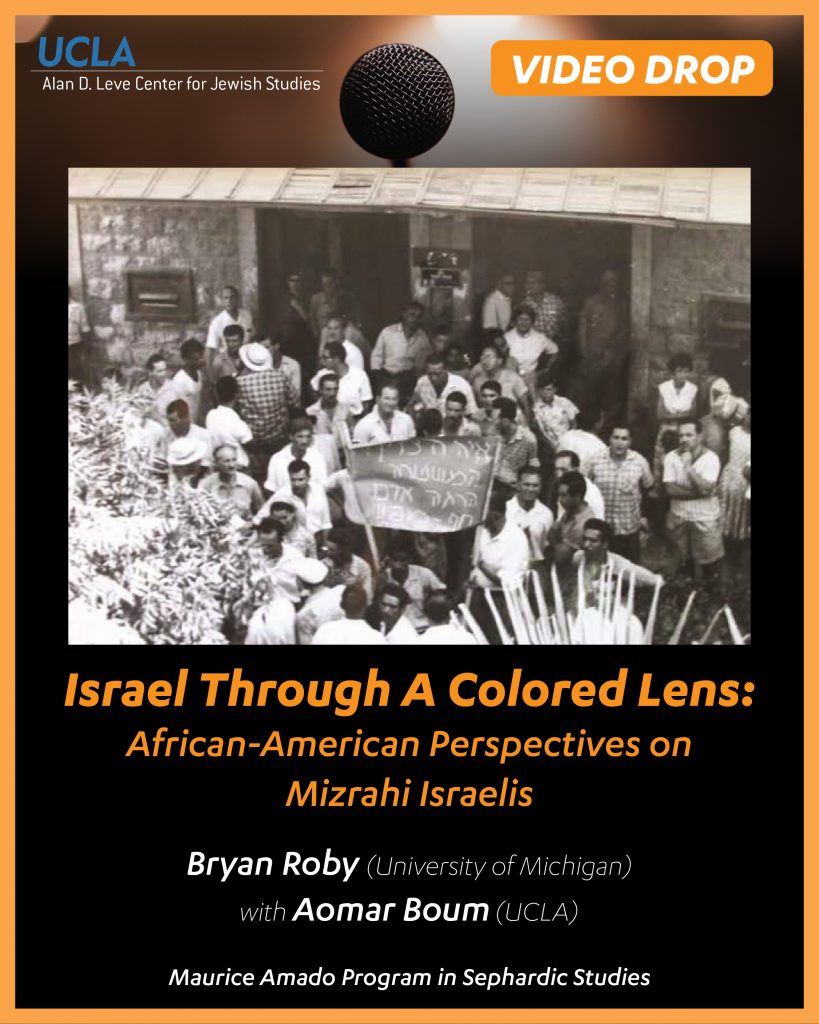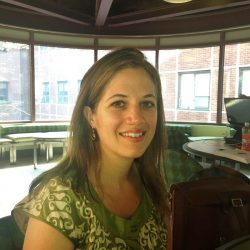
Housed in the UCLA Alan D. Leve Center for Jewish Studies, the Maurice Amado Program in Sephardic Studies offers students at the undergraduate and graduate level the rare opportunity to focus intensively on the study of Sephardic history and culture. It also hosts lectures, workshops and symposia open to the academic and wider Los Angeles community that cultivate and stimulate this field and situate UCLA as one of its principle hubs. It has supported international scholarship, building on the solid research and teaching program erected over the course of a decade and a half of Maurice Amado Lectures and more recently by the Maurice Amado Chair.
The UCLA Alan D. Leve Center for Jewish Studies is pleased to announce that Aomar Boum has been appointed as the new Maurice Amado Chair in Sephardic Studies. Boum has interdisciplinary training in anthropology, history, and Middle Eastern and North African studies. His research, both past and ongoing, reflects an expansive vision of Sephardic studies that aligns with the breadth of focus associated with the Maurice Amado Chair. He has authored or co-authored five books, among many other works, and has a forthcoming book project provisionally entitled “Moroccan Frames, Jewish Portraits: Diasporic Histories from Los Angeles.” His body of work includes localized ethnographic publications on Jewish- Muslim relations in Morocco; efforts to situate Jews and Muslims in relation to other ethnic and religious groups in the Maghrib and the Middle East; research related to the Holocaust and North Africa; and, more recently, work on Moroccan Jewishness as a global phenomenon.
At the Alan D. Leve Center, Boum has led efforts to build partnerships with the Moroccan Jewish community here in Los Angeles and in Morocco, and helped to secure our campus as a destination for scholars and students invested in the histories, cultures, languages, and literatures of Maghribi Jewries.
We congratulate Professor Boum and extend our deepest gratitude to the Maurice Amado Foundation for their enduring support and generosity. Since 1989, Sephardic Studies has developed into an ambitious and intellectually exciting academic focal point on campus, due in great part to our sustained partnership with the Maurice Amado Foundation. As we consider the future of the program under Aomar Boum’s tutelage, we look forward to continuing our collaborative work.
UCLA has supported programming in Sephardic Studies since receiving an endowment from the Maurice Amado Foundation in 1989. Initially UCLA hosted a series of distinguished and diverse scholars to serve as Visiting Maurice Amado Professors for one quarter each year. Among the visitors were Professors Yom-Tov Assis, Jonathan Israel, David Gilitz, Moshe Idel, Moshe Lazar, Edward Seroussi, Jonathan Ray and Shalom Sabar.
Meet Aomar Boum, UCLA’s new Maurice Amado Chair in Sephardic Studies
As a professor of anthropology and of Near Eastern languages and cultures at UCLA, Boum takes a global perspective on the history of Jews from Morocco, including those who settled in Los Angeles, New York or Montreal, while also examining the larger context of minorities in the Middle East and North Africa. (photo: Joel Mason-Gaines/USHMM)
Maurice Amado Program in Sephardic Studies
2024-2025 Events Sponsored by the Maurice Amado Foundation
Sephardic Culinary Heritage of the Jews of Spain According to the Oldest Medieval Spanish Cookbook
Hélène Jawhara Piñer (Fordham) Moderator: Aomar Boum (UCLA)
March 4, 2025
The transmission of Jewish culinary traditions has been crucial in shaping the Sephardic culinary heritage, reflecting the resilience and identity of Jewish communities in Spain. Despite historical challenges, Jewish cuisine has preserved its distinct flavors through family recipes and techniques. While modern Jewish cookbooks are common, medieval cookbooks, like the thirteenth-century Kitāb al-ṭabīẖ from the Iberian Peninsula, are exceptional. This text is the oldest known source to mention Jewish recipes and provides insight into the multicultural environment of the time. The inclusion of Jewish recipes in this Arabic-written cookbook raises questions about cultural exchange and adaptation, offering a deeper understanding of Sephardic cuisine and Iberian society’s complex social dynamics.
Maurice Amado Program in Sephardic Studies
Entwined Homelands, Empowered Diasporas: Hispanic Moroccan Jews and Their Globalizing Community
Aviad Moreno (Ben-Gurion University of the Negev) Moderator: Aomar Boum (UCLA)
November 20, 2024
The Hispanic Moroccan Jewish diaspora emerged as one of the most mobile and globally dispersed North African groups in the twentieth century, with hubs in Venezuela, Argentina, Brazil, Peru, Spain, Israel, Canada, France, and the US, among others. Migration and diaspora scholars often focus on nostalgia as well as national and cultural ties to a single primary homeland. Based on his new book, Entwined Homelands, Empowered Diasporas: Hispanic Moroccan Jews and their Globalizing Community (Indiana University Press, 2024), Aviad Moreno will discuss with Aomar Boum how Hispanic Moroccan Jews developed layered historical ties to multiple homelands, from more traditionally considered centers like Morocco and the Holy Land, to countries in South America, and medieval Spain. Challenging the typical national framing of Moroccan Jewish migration, Moreno will explain how this small community strategically employed ties to multiple homelands, driven by transnational networks that interconnected their hypermobile diaspora.
Maurice Amado Program in Sephardic Studies
2023-2024 Events Sponsored by the Maurice Amado Foundation
The Assassination of the King of Algiers: Trading Jews & the Napoleonic Mediterranean
Julie Kalman (Monash University) Moderator: Aomar Boum (UCLA)
February 26, 2024
On June 28, 1805, in the port of Algiers, Naphtali Busnach was assassinated, fatally stabbed in the street by a janissary. Busnach was a member of the extended Bacri family, trading Jews in the Regency of Algiers, a semi-independent regency on the western edge of the Ottoman Empire. The news of Naphtali’s death was reported in London and Paris, in the Times and the Journal des Débats. Foreign consuls in the port city sent news of the event to their respective ministers in London and Paris, but also Washington and Madrid. How is it that Naphtali Busnach was so well known, that his death was news in the metropoles of the west? In this conversation, I will explore the reactions to his murder, what they can tell us about Busnach’s place in the regency, and the broader significance of Jewish commerce in the Mediterranean in the age of Napoleon.
The Maurice Amado Program in Sephardic Studies
Moroccan Jews’ Migration through France: From Camp to Camp (1948-1956)
Yolande Cohen (Université du Québec à Montréal) Moderator: Aomar Boum (UCLA)
February 1, 2024
Professor Cohen’s personal search for her birthplace in Aubagne brought a discovery of dozens of transit camps in southern France. Searching in the French archives for the specific camp where she and her parents had spent a few years (1948-1953), she came across thousands of names of Jews from North-Africa that went through those camps, exiting Morocco, transiting in those camps in France, before boarding ships to Israel.Because this liminal moment in their migration is mostly ignored, Cohen will explore here the clandestine and complex organization that brought the French administration to allow those camps to flourish in its periphery, in the aftermath of the Shoah and during Morocco’s fight for independence from France.
The Maurice Amado Program in Sephardic Studies
2022-2023 Events Sponsored by the Maurice Amado Foundation
Recording History: Jews, Muslims, and Music across 20th Century North Africa
Christopher Silver (McGill University) with Aomar Boum (UCLA)
October 20, 2022
If twentieth-century stories of Jews and Muslims in North Africa are usually told separately, Recording History demonstrates that we have not been listening to what brought these communities together: Arab music. With this book, Christopher Silver provides the first history of the music scene and recording industry across Morocco, Algeria, and Tunisia, and offers striking insights into Jewish-Muslim relations through the rhythms that animated them.
The Maurice Amado Program in Sephardic Studies
2021-2022 Events Sponsored by the Maurice Amado Foundation
Forging Ties, Forging Passports: Migration and the Modern Sephardic Diaspora
Devi Mays (University of Michigan) with Aomar Boum (UCLA)
June 1, 2022
Forging Ties, Forging Passports is a history of migration and nation-building from the vantage point of those who lived between states. Devi Mays traces the histories of Ottoman Sephardi Jews who emigrated to the Americas—and especially to Mexico—in the late nineteenth and early twentieth centuries, and the complex relationships they maintained to legal documentation as they migrated and settled into new homes. Mays considers the shifting notions of belonging, nationality, and citizenship through the stories of individual women, men, and families who navigated these transitions in their everyday lives, as well as through the paperwork they carried.
Maurice Amado Program in Sephardic Studies
Refusing the Gift of Citizenship
Charles A. McDonald (Northwestern University) with Aomar Boum (UCLA)
November 3, 2021
Scholars writing about the Iberian citizenship laws have argued that we need to investigate how applying for citizenship has often prompted Sephardi descendants to rethink their ancestry, identity, and attachments. But what about those who chose not to apply? How should we read their decisions? Based on ethnographic fieldwork with prospective citizenship-seekers, this talk reads the refusal of citizenship as a political claim. I argue that any reckoning with the Iberian citizenship laws is incomplete without an analysis of how people negotiate citizenship and its attendant claims, particularly when states promote citizenship as a form of historical reparation.
Maurice Amado Program in Sephardic Studies
2020-2021 Events Sponsored by the Maurice Amado Foundation
The Sultan’s Communists: Moroccan Jews and the Politics of Belonging
Alma Heckman (UC Santa Cruz) with Chris Silver (McGill) and Aomar Boum (UCLA)
April 26, 2021
Challenging traditional narratives of Moroccan Jewish history in the 20th century, The Sultan’s Communists explores the lives of five prominent Moroccan Jewish Communists involved in Morocco’s national liberation project who survived oppressive post-independence authoritarian rule to become heroic emblems of state-sponsored Muslim-Jewish tolerance, offering a new perspective on how Jews grappled with colonialism, nationalism, Zionism, and citizenship in the context of the post-independence Arab world.
Maurice Amado Program in Sephardic Studies
The Blood Libel in Modern Eastern Europe: A Social History
Bryan K. Roby (University of Michigan) in conversation with Aomar Boum (UCLA)
November 5, 2020
This talk explores African-American interactions with Middle Eastern Jewish Israelis in the 1950s and 1960s. The focus will be on how African-Americans navigated racial constructs in Israeli society as well as an exploration of their observations on racial dynamics in Israel. I center the travel writings of scholar and social worker Ida B. Jiggetts, who wrote extensively on the social positioning of North African and Yemenite Jewish immigrants to Israel. I conclude with reflections on how Israeli Jewish racial constructs influence current day perceptions of Israel.
Maurice Amado Seminar in Sephardic Studies
2019-2020 Events Sponsored by the Maurice Amado Foundation
Modernity in the Eastern Sephardi Diaspora: The Jews of Late Ottoman Izmir
Dina Danon (Binghamton University)
February 12, 2020
This lecture will tell the story of a long overlooked Ottoman Jewish community in the late nineteenth and early twentieth centuries. Drawing extensively on a rich body of previously untapped Ladino archival material, the lecture will also offer a new read on Jewish modernity. Across Europe, Jews were often confronted with the notion that their religious and cultural distinctiveness was somehow incompatible with the modern age. Yet the view from Ottoman Izmir invites a different approach: what happens when Jewish difference is totally unremarkable? What happens when there is no “Jewish Question?” Through the voices of beggars on the street and mercantile elites, shoe-shiners and newspaper editors, rabbis and housewives, this lecture will underscore how it was new attitudes to poverty and social class, not Judaism that most significantly framed this Sephardi community’s encounter with the modern age.
2018-2019 Events/Podcasts Sponsored by the Maurice Amado Foundation
Thought Crimes: Subversive Politics in Art Made for Medieval Jews
Marc Epstein (Vassar College)
March 7, 2019
Marc Michael Epstein will explore issues of temporality (the way in which the passing of time is indicated or implied) in illuminated manuscripts made for Jews in the fourteenth century. What happens when, viewing images as a frozen snapshots in time, we consider the potentially politically subversive implications of the implied action that will ensue in the moment after the one that is frozen in the frame? What can we learn from such considerations about the political and theological views of the constellation of patrons, rabbinic advisors, scribes, designers, illustrators and illuminators who collaborated to produce these beautiful and iconographically complex masterpieces?
Jewish Studies in Morocco: A Conversation
Khalid Ben-Srhir (Mohammed V. University, Rabat) with Aomar Boum (UCLA)
January 15, 2019
Professor Khalid Ben-srhir is by academic trade an expert on British Moroccan relations. However, in Morocco he is also known as “Mr. Jewish Studies translator.” Ben-srhir started his career as a secondary school teacher in Morocco’s southern hinterland before he joined University Mohamed V as a Professor. Today, he is not only the editor of the oldest history journal in Morocco, Hesperis-Tamuda, but also a pioneer and an established name in the Arabic and French translation of Jewish Studies scholarship. In this informal conversation, UCLA Professor Aomar Boum will talk with the Center’s Moroccan guest about his personal and professional experiences with Jewish history in Morocco, as well as the state and future of research on Moroccan Jews and Judaism.
